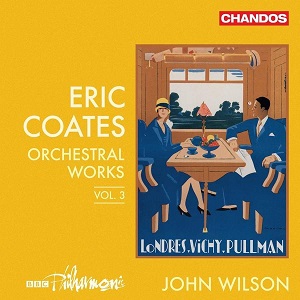
Eric Coates (1886-1957)
Orchestral Works – Volume 3
Television March (1946)
The Three Men, suite for orchestra (1935)
Cinderella, a phantasy (1929)
The Dam Busters (1954)
Last Love (1939)
Sweet Seventeen (1954)
The Three Elizabeths (1944)
BBC Philharmonic/John Wilson
rec. 2022, MediaCity, Salford, UK
Chandos CHAN20164 [66]
Whilst some critical blood has been spilt in the discussion of John Wilson’s recordings with the Sinfonia of London, I think we can all agree – at least, I hope we can – that he is on home turf with Eric Coates. This is the third volume in the Chandos series and I reviewed volumes 1 and 2 as they were released.
The avid Wilson fan will, however, know that earlier still he recorded Coates albums for ASV and that two decades ago recorded London Again on the label of the Royal Liverpool Philharmonic (AV2070). It duplicates The Three Men Suite, Cinderella and Television March which are all heard in this third Chandos volume. However, Wilson and the BBC Philharmonic have their own way with this music, two decades have passed, and recording in the MediaCity lends a classy lustre to these new-minted performances.
As ever, Wilson ensures that variety – marches, suites, phantasies, romances and concert waltzes – is the key to successful programming of this material. The Television March, a BBC commission which gave Coates just three weeks’ notice, drew from him accustomed trimness and spruce wit. It’s tightly constructed, could be whistled by any errand boy, and ends with a winning Allargando. The Three Men – who come from the Country, the Town and the Sea – is an orchestral suite that infuses folkloric hints into its fabric; certainly, in the first named. For the central panel, the Man about Town is shadowed by a legato saxophone in a syncopated milieu that’s not averse to a dance band foxtrot. The Man from the Sea draws from Coates a love of the shanty that slides into Three Blind Mice, fugally developed, with increasing wit.
Cinderella is a charming 15-minute Phantasy which oscillates between languorous romance, avuncular waltz themes, somewhat Iberian elements and a sure sense of generous drama, a delightful cantilever that moves from Cinderella asleep to the fitting of the shoe, served up with Coates’ characteristically elegant and apposite orchestration and sense of verve. A contrasting trio then follows. The Dam Busters remains a firm favourite though it was written before Coates’ commission for the film, which he rejected in favour of writing just the main March theme. Nevertheless, it fits well and Wilson directs it with obvious enjoyment. After Last Love, one of his regular commissions for Chappell, though written in the uneasy year 1939, there’s Sweet Seventeen, a nostalgic concert waltz written for his wife.
The final music is another suite, The Three Elizabeths, yet again one of his better-known works. The opener, Halcyon Days, is full of sharp characterisation, deft orchestration and a sense of colour and adventure, the central panel devoted to Elizabeth of Glamis is languid, wind-flecked and romantic and led by the oboe of Will Oinn with some Dvořákian hints along the way. In the March finale Wilson doesn’t press the tempo and draws out the grandioso elements – all the better in this slightly steadier way.
The Wilson-BBC Philharmonic team stand comparison with any present day pairing in this repertoire, and have been splendidly recorded.
Jonathan Woolf
Help us financially by purchasing from





















